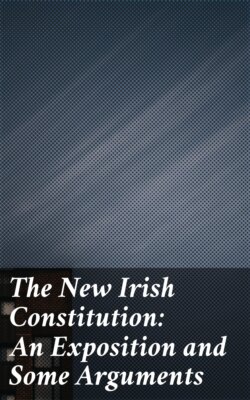Читать книгу The New Irish Constitution: An Exposition and Some Arguments - Various - Страница 12
На сайте Литреса книга снята с продажи.
The Irish Legislature
ОглавлениеTable of Contents
The constitution of the legislature itself calls for little comment. It follows with some fidelity the features [pg 036] of Mr. Gladstone's Bills, but the substitution of a nominated Senate for the “Council” or “Order” elected on a property franchise is a new departure. Nomination of late has fallen into some discredit both in theory and in practice.51 Colonial experience is not encouraging. Nomination by the Crown means in practice nomination by the Governor, on the advice of the Cabinet of the day, and Ministries in Canada and New South Wales have put this prerogative to such partizan uses as to reduce the Upper House to a very servile condition. When nomination is for life and not for a fixed term of years the evils of this system may be mitigated, but they are not removed. The one thing that can be said about the proposed Senate is that its powers in legislation are of such a limited character that an Irish Executive would be under little temptation to “pack” it. A Senate of only forty members compelled to meet in joint session a House of Commons of 164 members every second time that it rejects or objectionably amends a bill is not likely to prove a very formidable obstacle to legislation. But the nomination by the Executive is in any case somewhat objectionable, and it would seem better to provide that at the end of the first term of eight years the Senators should be appointed by some system of election, whether on a basis of proportional representation or otherwise.52 But [pg 037] to their nomination for the first term by the Imperial Government I see no very cogent objection. Indeed, the expedient has much to be said for it, for the discretion, if wisely exercised, will enable the Imperial Government not only to secure to Irish minorities a degree of representation which no conceivable system of election could secure, but also to appoint men of moderate opinions—one immediately thinks of Sir Horace Plunkett—who, in the strife of extremists, might have no chance of election by either party. It has been argued in some quarters that a Second Chamber is wholly unnecessary, and the example of the single-chamber legislatures in some of the Canadian provinces has been cited. The argument, however, overlooks one really important function of the Senate, namely its duty to provide for the security of tenure of the Irish judges. Clause XXVII. provides that judges appointed after the passing of the Act shall only be removable on an Address of both Houses of the Irish Parliament, and, should the Senate refuse to concur in a demand by the lower House for the removal of a judge, there is no such means of overcoming its resistance in a joint session as is the case with legislation. This is well.
There is one provision in the Bill53 which will serve to strengthen the position of the Senate as an advisory body and may operate to give it an initiative in the introduction of Government legislation—the provision which enables an Irish Minister who is a member of either House to sit and to speak in both Houses. This is a practice common on the Continent, and not wholly unknown [pg 038] in the case of some of our Colonial Constitutions, and it has much to commend it. The Senate is placed under the same disabilities as to money bills as are imposed on the House of Lords by the Parliament Act. Thereby it is placed in an inferior position to that of most of the Second Chambers in the Colonies, all of which can reject, and some of which may also amend, money bills. The disability is the less surprising having regard to its character as a nominee body—it is when the Second Chambers of the Colonies are elective, that their powers in regard to money bills are considerable.54
The privileges of the Imperial Parliament are conferred by the Government of Ireland Bill upon the Irish Parliament. In the absence of such grant the Irish Parliament would not have had such privileges—although it might have adopted them by legislation—for the lex et consuetudo Parliamenti are not implied in the grant of a constitution.55 It is not uncommon to prescribe in Colonial Constitutions that the legislature shall have such privileges as are enjoyed by the House of Commons at the time of grant. In the present case, the Irish Parliament may define its privileges, if it thinks fit, by legislation, though it is difficult to imagine any occasion for its doing so. The really important thing is that it cannot enlarge those privileges beyond the scope of the privileges of the Imperial Parliament. This is the one constitutional limitation in the Bill—apart from the “safeguards” as to legislation in regard to religion and marriage contained in Clause III.—and it is by no means unimportant. The powers of the Imperial Parliament—particularly as to the right [pg 039] of the two Houses to commit for contempt without cause shewn—are a sufficiently high standard.
